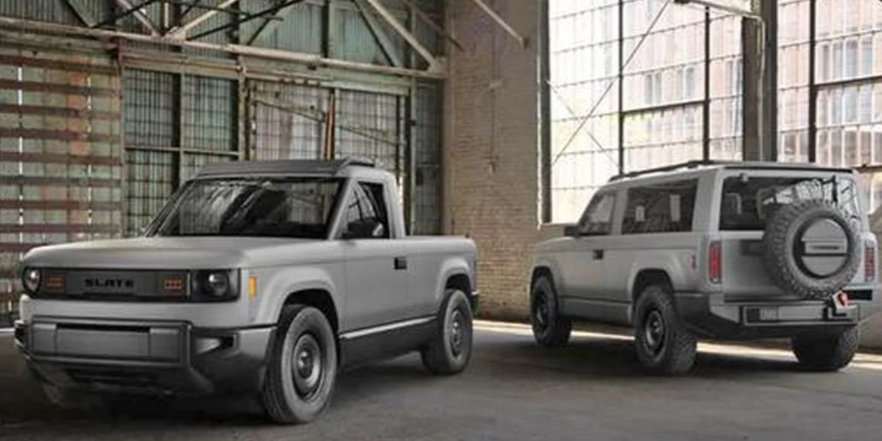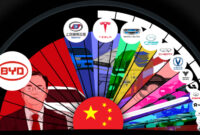Introducing Slate, the new automotive brand that has recently debuted in the US with its first vehicle — an extremely affordable and highly customizable electric truck.
This new brand, a start-up supported by notable figures like Jeff Bezos from Amazon, has revealed its electric vehicle aimed at simplifying things.
Its design is distinctly retro, showcasing clean surfaces and practical design elements. Additionally, its dimensions echo the past, with Slate mentioning that its base model resembles pick-up trucks from the 1980s rather than the massive vehicles commonly seen today.
Slate’s CEO, Chris Barman, emphasizes the importance of affordability with the brand’s new truck. He states, “The definition of what’s affordable is broken,” further explaining that the “radical truck platform is so customizable it can convert from a two-seat pick-up to a five-seat SUV.” This transformation is facilitated by what Slate refers to as a “flat-pack accessory SUV kit.” So, prepare to grab your Allen keys.
This feature also supports significant customization, with Slate envisioning a variety of kits and styles derived from the base model. The truck is purposely designed to be straightforward, including elements like steel wheels, manual roll-down windows, and physical controls inside. For infotainment, Slate simply provides a mount for your phone.
The truck operates entirely on electricity, incorporating a suitably sized battery — a 52.7kWh pack coupled with a 201bhp electric motor located on the rear axle. Slate claims this model aims for a 150-mile range. If that falls short, a larger 84.3kWh pack will be available, increasing the maximum range to 240 miles.
Slate plans to manufacture its trucks in the United States, which will likely please the current administration and its supporters, and mentions that the starting price for the truck will be under $20,000 after federal incentives, translating to £15k in the UK.
Inside the electric vehicle startup closely linked to Jeff Bezos
Jeff Bezos is financially supporting a discreet EV startup based in Michigan known as Slate Auto, which may commence production as early as next year, according to various sources and documents connecting the billionaire’s family office to the startup.
Slate originated from another Bezos-affiliated enterprise called Re:Build Manufacturing and has been operating quietly since its establishment in 2022. The company has hired numerous employees while remaining under the radar — many of whom have backgrounds with Ford, General Motors, Stellantis, and Harley-Davidson.
It has also gained support from several wealthy individuals, including Mark Walter, who is the controlling owner of the LA Dodgers and CEO of Guggenheim Partners, as well as Thomas Tull, a lead investor in Re:Build Manufacturing, based on documents obtained by TechCrunch from Delaware’s Division of Corporations.
Slate Auto is pursuing an ambitious objective: to produce an affordable two-seat electric pickup truck priced around $25,000, according to two individuals who were granted anonymity to discuss the company’s internal matters. Company leaders have cited the Ford Model T or Volkswagen Beetle as inspirations for this venture, according to these sources.
It has gathered a considerable amount of funding towards achieving this target.
The company discreetly secured at least $111 million in a Series A funding round in 2023, according to a public filing. Bezos was involved in this round, and Melinda Lewison, who manages his family office, is mentioned as a director in the documentation Slate has submitted to state and federal authorities. The filing indicates that 16 individuals invested in this round; however, the exact contribution from Bezos remains unclear.
Slate has informed its employees about the closure of a Series B funding round late last year, according to several sources familiar with its financial activities. The company has yet to submit any documentation for this round to the Securities and Exchange Commission. Delaware records show it authorized nearly 500 million preferred shares for the Series B, priced at $2.37 per share. (Slate has also authorized over 400 million common stock shares in the past year, but the filings did not specify a price.)
The Delaware records indicate that Walter and Tull are new board members, implying they made investments in Slate’s Series B round. Recently, they formed a $40 billion holding company for their investments. Walter and Tull could not be reached for comment.
Slate intends to have its vehicle in production by late 2026 at a manufacturing plant located near Indianapolis, Indiana, based on job postings, state lobbying records, and a 2024 interview with executive chairman Rodney Copes. It is currently unclear whether Slate has bought an existing facility or plans to construct one from the ground up.
This secretive project is developing during a difficult period for electric vehicles.
The previously explosive growth of the industry has decelerated, and several startups dedicated to EV production have gone bankrupt. Those that have persisted, like Rivian and Lucid Motors, have done so by expending billions of dollars.
Slate intends to enhance the slim profit margins of its affordable truck by expanding its range of accessories and apparel that owners can use to personalize their vehicles and enhance their appearance, according to various sources and job postings. The company has recruited executives from Harley-Davidson and Stellantis — two firms that have historically relied on these types of auxiliary businesses (the former with clothing and the latter with MoPar parts and accessories).
Based in Troy, Michigan, Slate has also showcased a prototype vehicle to potential investors at a discreet design studio it’s leasing in Long Beach, California, as per the sources. The company has aimed its efforts at high-net-worth individuals while keeping its fundraising process under wraps.
Multiple representatives from Slate, Re:Build Manufacturing, and Bezos’ family office did not respond to numerous requests for comments regarding this story. TechCrunch also attempted to contact Bezos directly but did not receive a reply.
Slate is deeply intertwined with Amazon.
In addition to funding from Bezos’ family office, Slate’s Series A funding round included backing from former Amazon executive Diego Piacentini, based on information from his firm’s website.
Slate originated as a project called Re:Car in early 2022 under Re:Build Manufacturing, a domestic manufacturing incubator co-founded by ex-Amazon Consumer CEO Jeff Wilke and his MIT Leaders for Global Operations classmate Miles Arnone. Several seasoned Amazon executives, including Wei Gao, a former top VP and technical adviser to Bezos, have also joined Re:Build Manufacturing.
Slate’s leadership in digital, e-commerce, and automotive sectors consists of former Amazon employees. Moreover, Slate’s original name features the “re:” prefix that Amazon uses for events, like the re:MARS robotics and AI conference or its annual re:Invent gathering for AWS.
Over the years, Bezos has made investments in more than 30 companies through his family office, impacting sectors such as AI (Perplexity), robotics (Figure), defense (Anduril), and even mobility (Uber). Slate represents one of the most direct investments he has made in electric vehicles, aside from Amazon’s relationship with Rivian.
However, his involvement has mostly been limited to investment. Sources familiar with Slate’s internal dynamics indicated to TechCrunch that he has not been seen at the company’s offices in Michigan or Los Angeles.
Defying the norm, nearly all electric vehicle startups that have emerged (and vanished) over the past decade have attempted to mirror Tesla’s strategy. They have created initial vehicle models as high-end products, allowing them to sell fewer cars at higher prices. Over time, after gaining brand recognition, these companies transition to offering higher-volume, more affordable EVs with smaller profit margins.
In contrast, Slate is targeting what it hopes will be a buyer’s “first car,” according to sources who spoke with TechCrunch.
The strategy is to sell the truck at approximately $25,000, allowing owners to customize or upgrade the vehicle gradually as their finances allow.
In late March, Slate applied for a trademark for the slogan: “WE BUILT IT. YOU MAKE IT.” This trademark could apply to a wide range of goods and services, from switches and speakers to USB ports and pet harnesses.
More insights can be gathered from the numerous job listings Slate has posted over the past two years.
One listing from 2024 suggested that the company will name the customer customization initiative “Slate University.” The original title was “University Lead” but changed to “Head of Customer Education Repair & Maintenance” before the company stopped accepting applications.
“We are looking for an enthusiastic, experienced Leader of Slate University to establish and manage our innovative approach to open-source content for customers to enhance their ownership experience,” the listing states. “In this role, you will drive the strategy and ecosystem development for educational content and delivery for Slate shoppers, customers, technicians, and partners.”
Another job posting for “Lead Product Manager, Accessories” indicates that Slate is “exploring opportunities in the electric mobility space and is developing complementary accessories, apparel, and merchandise capabilities.” It also mentions that this person would be in charge of developing “utility parts” and “lifestyle and personalization accessories.”
This strategy — subsidizing a low-margin manufacturing business with higher-margin accessories — has been adopted by automakers, including Harley-Davidson with its apparel division and Stellantis with its Mopar parts and service division.
Not surprisingly, Slate is already drawing on expertise from both companies as it assembles its team.
The startup’s executive chairman, Rodney Copes, has two decades of experience with Harley-Davidson. Chief Financial Officer Ryan Green spent about ten years in finance at the motorcycle manufacturer. (Copes and Green also have backgrounds at Rivian.) Slate’s heads of service, commercial, and accessories product management are also from notable automotive backgrounds.
Slate seems to intend to obtain its high-voltage battery pack, electric motors, and other associated technologies from external suppliers, based on a job posting. The startup is “challenging the status quo of vehicle design,” as indicated by another listing seeking a design/release engineer for windshield wipers. A job advertisement for an accountant position mentions that the individual hired would need to assist in establishing the “required systems to be a public company.”
In addition, any candidate for the head of PR and communications role is required to “Must love cars! You’ll be thinking about cars all day every day, and it’s the most fun when you love cars.”
No founder is present
Another indication that Slate is deviating from the norm of other EV startups is that it lacks a founder in the role of CEO.
Arnone is recognized as Slate’s founder by those who spoke with TechCrunch; however, he serves primarily as the CEO of Re:Build Manufacturing.
Instead, Christine Barman, a seasoned veteran from Chrysler, holds the position of CEO at Slate. She entered the automotive field through an internship at General Motors after graduating from Purdue University, according to an interview from 2023.
She then spent over 20 years at Chrysler, managing the vehicle line program for the Chrysler 300, Dodge Charger, and Jeep Cherokee, as detailed in her LinkedIn profile. Barman eventually rose to the role of vice president of electrical and electronics at Fiat Chrysler, where she oversaw the integration of Android Automotive and collaborated with Waymo before leaving the company in 2017.
Unlike many of her EV startup CEO counterparts, Barman has not spent the last decade sharing updates online. Instead, she has mostly been advising firms on emerging technology and teaching engineering until she became involved in 2022 with what was then an early EV initiative within Re:Build Manufacturing.



